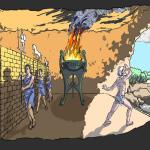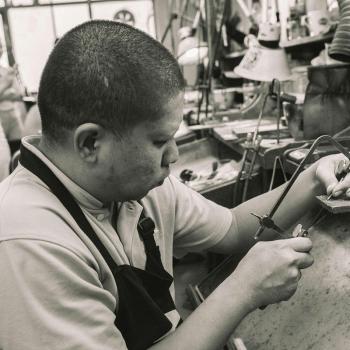Is there a right or wrong way to grieve? Is it possible to get “stuck” in grief? For many Christians, November 1 is All Saint’s Day, and November 2 is All Soul’s Day. It’s a time for remembering your departed loved ones, and for dealing with your grief. In this article, I’ll discuss whether you’re grieving in a healthy way. I’ll talk about how to know it’s time to get some help in your grief work.

People Say the Stupidest Things
Perhaps your loss is quite fresh. A lot of people will say the stupidest things when they offer their condolences. In my article, “Ten Things Christians Shouldn’t Say to Grieving People,” I discuss horrible ways people try to assuage their own sense of loss with trite and thoughtless comments. As you grieve, and as you hear some of these ridiculous phrases, I hope you’ll give them the grace to know that they just aren’t equipped to deal with your type of grief. They’re doing their best, even if they’re doing it wrong. Maybe you could share my article with them, to help them to see how they should stop saying these kinds of things. But you can still know they care for you and are trying to help—even if their help isn’t working.
One of the things people will tell you is that it’s “time to move on,” or that you’re grieving the “wrong way.” Sometimes it’s because they’ve observed that there’s something unhealthy about the way you’re grieving. But other times it’s only due to the fact that they’ve moved on, and you’re making them feel uncomfortable and awkward with your grief. How can you know when your friends are just being insensitive, or when you actually need help? Is there a right or wrong way to grieve?
Stages of Grief
Everybody grieves differently. This means that there is no one correct way to grieve. In Elisabeth Kubler-Ross’ seminal book, “On Death and Dying,” the author discusses the five stages of grief. It’s a great read, and I hope you’ll check it out.
- Denial – Hits immediately after a loss. In this stage, you question whether the loss is even real.
- Anger – You feel angry at God, doctors, lawyers, your spouse, or any scapegoat you can blame for the loss you’re experiencing.
- Bargaining – You might say, “God, if you could just spare me this loss, I’ll buy the church that new pipe organ.” Or, conversely, you might say, “God, if you take this person away, I’ll never believe in you again!” Or you might bargain with others to try to avoid or reverse loss.
- Depression – The sense of loss has finally overwhelmed you. You feel stifled by it, devastated by sudden stabbing memories and suffocated by pain.
- Acceptance – This doesn’t mean you’ve “moved on,” but it does mean you have finally come to acknowledge the reality of your new normal.
Not a Linear Process
The problem with these five stages is that it’s not a linear process. Some people skip stages or linger on some stages longer than others. For example, you might experience denial, anger, and bargaining, and go straight to acceptance without the depression. Thanatologists try to make death and grief an exact science, but there is much that is subjective about it. Some have added to Kubler-Ross, and come up with seven stages of grief. However we count them, these stages do help us to understand that the way we’re feeling is normal. There’s a predictable beginning, a likely process, and a destination for your grief. Your grief might be shaped differently from other people’s—but what you’re going through is normal, considering what you’ve experienced.
Notice that I say there’s a destination for your grief—not an end. The “acceptance” part of grief doesn’t mean you’re completely okay. Some griefs are like scars that can get sore and red sometimes, even after years of healing. But you learn to accommodate that pain. You learn to live with it. The goal is that one day, you will learn how to function. You’ll find joy again. You’ll find peace. That doesn’t mean you’ve quit missing or loving that person, the situation, or the thing you’ve lost. It simply means you’ve adapted.
Getting Creative
Sometimes working through your grief means you get creative. I knew a family who lost a son/brother/father. Their way of grieving was to leave little trinkets at the young man’s grave. The problem was that the church cemetery had strict bylaws against leaving such ornaments, as it made things difficult for the gardeners. As their solution, the family offered to cut the cemetery grass for free—as long as they could continue to leave their gifts. The church agreed, and the family was able to continue to work through their grief. Sometimes you have to get creative as you discover how to manage your grief.
Letting the Grief Be What It Is
Almost a year ago, my wife’s nephew passed away. Everyone in the family has grieved differently. One thing Christina told me was that when the memories come, they may be happy remembrances that make her laugh. Or they might be tragic recollections that fill her with pain. Either way, she allows herself to feel whatever emotions sweep over her. But then she will enable the grief to be what it is, and lets it go. This doesn’t mean she lets Brendin go—but it means she lets herself feel, then herself heal. In this way, she doesn’t get stuck in her grief.
“Getting Stuck” in Your Grief
Some friends may caution you that you don’t want to “get stuck” in your grief. They may suggest that you’re grieving the wrong way. As I’ve already established, just because your grief doesn’t look like theirs, that doesn’t make it wrong. The stages are flexible, and no two griefs are the same. But it is possible to grieve in an unhealthy way. There’s no one-year rule, but many people find their grief easing after they’ve gone the whole cycle of holidays without a person. Those first Christmases, birthdays, and other occasions tend to be more difficult than subsequent ones. If you find that you’ve gone years and you’re still wracked with inconsolable grief, you might be stuck.
You might also be stuck if you can’t move from one stage of grief to another. If you remain in denial or anger, and just can’t seem to get to depression, something’s wrong. Or, if you’ve been depressed for so long that you can’t see the hope of acceptance, you might need to consider grief counseling.
While there’s no one right way to grieve, there are indicators of grief being healthy or unhealthy. Healthy grief eventually heals. Unhealthy grief cripples and debilitates a person. Don’t let people tell you how to grieve—but if enough people tell you that your grief is unhealthy, you might want to step back and evaluate it yourself, to see if there might be some truth to their words. While all grief has its crippling moments, if it continues to incapacitate you so that you can’t work, play, enjoy other relationships, or have fun without guilt, then you might need some help. Talk with your pastor. Make an appointment with a qualified therapist. But don’t remain in a debilitating level of grief.
Pooh Bear Gets Stuck
I’m reminded of AA Milne’s story, In Which Pooh Goes Visiting and Gets Into a Tight Place. When Pooh visits Rabbit’s house, he indulges in too much honey and finds himself stuck, trying to climb back to the surface. It takes all of his friends, working together, to pull him out. The same is true for those who consume too much grief. It’s not that they want to be stuck, but they certainly reach a point where they cannot climb out on their own. It takes a whole team of people—clergy, friends, counselors, and more—to bring them to the surface. If you find yourself stuck, don’t hesitate to reach out to others who can help bring you to the surface.
Recommended Reading
Is there a right or wrong way to grieve? For further reading, try these suggestions:
- In the little book Lament for a Son, author Nicholas Wolterstorff narrates the story of his own grief for his son who died in a mountaineering accident. I have used it in grief counseling groups, to help people work through their own sense of loss. Sometimes reading narrative is better than reading books on thanatology.
- I also recommend the amazing book A Grief Observed, by children’s author and theologian CS Lewis, who relied on his own grief notebooks to write about the loss of his wife.













